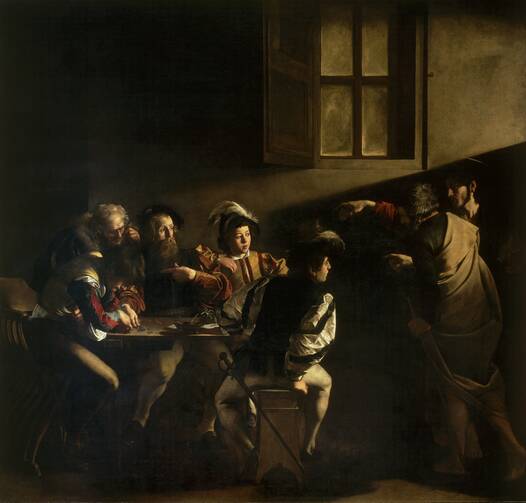A Reflection for the Feast of Saint Matthew, Apostle and evangelist
Find today’s readings here.
As Jesus passed by,
he saw a man named Matthew sitting at the customs post.
He said to him, “Follow me.”
And he got up and followed him (Mt 9:9).
Whenever I have the opportunity to visit Rome, I make a point of popping into the church of San Luigi dei Francesi. While there are hundreds of churches to visit in the city, I seek out this particular church because in it hang several works by Caravaggio, including one of his most well known paintings, “The Calling of Saint Matthew.”
I usually try to find a time when few others are inside, snake my way to the front of the church, turn left, and gaze up at the large oil painting. I soak in the interplay of light and darkness, the subtleties of stance and stares, which all meld together to capture a moment described succinctly in today’s Gospel, in which Jesus tells the despised tax collector, “Follow me.” Matthew responds simply, it seems, by getting up and following Jesus.
Standing in front of the Caravaggio is a moving experience, especially when considering what the depicted moment has meant to so many Christians, including Pope Francis.
In his 2013 interview with a group of Jesuit journals, Francis explained that when he visited Rome as a bishop, he would often spend time contemplating Caravaggio’s “Calling” because the story spoke to him.
That is what Matthew’s feast day commemorates: the calling of sinners back to God, whose mercy knows no limits, especially for those who think they are beyond it.
“That finger of Jesus, pointing at Matthew. That’s me. I feel like him. Like Matthew,” the pope said. “It is the gesture of Matthew that strikes me: he holds on to his money as if to say, ‘No, not me! No, this money is mine.’ Here, this is me, a sinner on whom the Lord has turned his gaze.”
Francis said he recalled that image “when they asked me if I would accept my election as pontiff,” in part because of the mercy it so powerfully conveys.
The pope continued, “I am a sinner, but I trust in the infinite mercy and patience of our Lord Jesus Christ, and I accept in a spirit of penance.”
Ultimately, that is what Matthew’s feast day commemorates, the calling of sinners back to God, whose mercy knows no limits, especially for those who think they are beyond it.
Preaching on the Feast of St. Matthew in Cuba in 2015, Francis returned to the image, fixating on Jesus’ gaze at Matthew. Not a look of condemnation or anger, but love.
Jesus, the pope said of his interaction with Matthew, “looked at him with the eyes of mercy; he looked at him as no one had ever looked at him before.”
That interaction, a single moment of kindness, changed Matthew’s life.
“This look unlocked Matthew's heart," Francis preached. “It set him free, it healed him, it gave him hope, a new life.”







